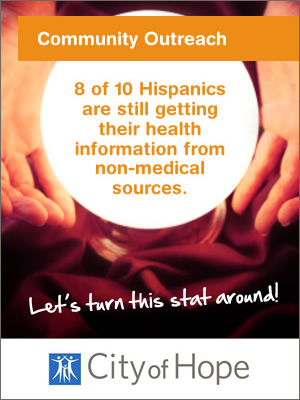
Survey Reveals Hispanic Thoughts on Diabetes
09/21/2015 05:00PM | 14436 viewsHispanics are almost twice as likely as non-Hispanic whites to be diagnosed with diabetes, a life-long, chronic disease characterized by abnormally high levels of blood sugar. Though the disease is always a concern among the Hispanic population, diabetes perceptions vary significantly, according to a recent survey.
Among the key findings of the report, released by the National Alliance for Hispanic Health, was Hispanics with diabetes were more likely to worry that, besides themselves, someone in their family would develop diabetes, when compared to non-Hispanic whites and non-Hispanic blacks; however, only 86 percent of Hispanic respondents believed a person could live a healthy life with diabetes compared to 96 percent of non-Hispanic whites and 89 percent of non-Hispanic blacks with diabetes.
“Diabetes has touched the lives of millions of Hispanic families,” Jane L. Delgado, Ph.D., M.S., president and chief executive officer of the National Alliance for Hispanic Health, said in a press release. “The insights gleaned from our survey confirm that diabetes is a concern of many Hispanics and will help improve educational support and diabetes management efforts. These efforts are critical, especially considering Hispanics are nearly twice as likely as non-Hispanic whites to be diagnosed with diabetes.”
The Office of Minority Health indicates that in addition to a high rate of diabetes diagnosis, Hispanics have higher rates of end-stage renal disease caused by diabetes, and are 50 percent more likely to die from diabetes compared to non-Hispanic whites.
“The survey showed us that there are specific areas within diabetes education and awareness that need to be addressed in order to raise awareness among Hispanics,” said Dr. Luis Salmun, executive director of health sciences executives, Boehringer Ingelheim Pharmaceuticals, Inc. “The valuable information we gained will help us to develop educational tools and resources that are relevant and meaningful to the Hispanic community.”
Findings of the survey included:
- 87 percent of Hispanics with diabetes believe a person can take actions to prevent diabetes compared to 80 percent of non-Hispanic whites and 69 percent of non-Hispanic blacks.
- Only 16 percent of Hispanics with diabetes cite maintaining a healthy weight as a way to manage diabetes, compared to 25 percent of non-Hispanic whites and 8 percent of non-Hispanic blacks.
- More than two-thirds of Hispanics with diabetes (64 percent) report they know someone with diabetes, compared to non-Hispanic whites (77 percent) and non-Hispanic blacks (69 percent).
- Of the 98 percent of Hispanics with diabetes who said a person can take actions to control diabetes, only 12 percent cited seeing a health care provider regularly as an action to manage the condition.
- 25 percent of Hispanics with diabetes responded “no” or “don’t know” when asked if their doctor or other health care provider had told them what type of diabetes they have.
- 73 percent of Hispanics with diabetes could name a cause of diabetes.
- 38 percent of Hispanics without diabetes could not name a symptom of diabetes.
- Only 3 percent of Hispanics cited monitoring blood sugar as a way to manage diabetes; 30 percent cited being physically active; 37 percent cited taking a medication.
Though awareness that diabetes is an issue for Hispanics appears to be at good levels within the community, experts indicate too much information about diabetes is still missing. Patients aren’t satisfactorily able to identify diabetes symptoms and risks, and individuals aren’t aware of simple dietary and physical activity-based precautions they can take to stay healthy.
The National Alliance for Hispanic Health hopes to use this most recent survey information to help develop programs to fill in the gaps for Hispanics when it comes to diabetes care and knowledge.











Post your Comment
Please login or sign up to comment
Comments